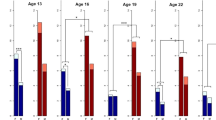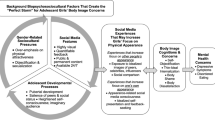Abstract
In our media-centric age, stories and commentary about children’s gender socialization are exchanged online. Yet we know quite little about how fathers interpret the gender and sexual identities of their children and share those interpretations with others via social media. In this article, I present findings from a qualitative content analysis of blog posts about children’s gender and sexuality (n = 122) written by American and Canadian fathers (n = 36). I apply Kane’s (2012) “gender trap” typology to analyze how dad bloggers support and/or challenge heteronormative gendered identities, behaviors, relationships, and activities for children. Most of these fathers present anxious accounts of experimenting with gender-neutral parenting, imagining their children in future roles and relationships, permitting nonconformity in girls versus boys, and connecting childrearing to broader social inequalities. I develop the concepts of sticky essentialism—to demonstrate how essentialist logics permeate fathers’ explanations for gendered childhoods, and ambivalent (de)gendering—to explain fathers’ mixed feelings toward heteronormative gender socialization and accountability. To conclude, I discuss risks and benefits of fathers blogging publicly about children’s gender and sexuality.
Similar content being viewed by others
Availability of data and material
Not applicable.
Code availability
Not applicable.
References
Altheide, D. L., & Schneider, C. J. (2013). Qualitative media analysis (2nd Ed.). SAGE Publications.
Averett, K. H. (2016). The gender buffet: LGBTQ parents resisting heteronormativity. Gender & Society, 30(2), 189–212. https://doi.org/10.1177/0891243215611370
Berkowitz, D., & Ryan, M. (2011). Bathrooms, baseball, and bra shopping: Lesbian and gay parents talk about engendering their children. Sociological Perspectives, 54(3), 329–350. https://doi.org/10.1525/sop.2011.54.3.329
Bianchi, S. M. (2011). Family change and time allocation in American families. The Annals of the American Academy of Political and Social Science, 638, 21–44. https://doi.org/10.1177/0002716211413731
Blum-Ross, A., & Livingstone, S. (2017). “Sharenting”, parent blogging, and the boundaries of the digital self. Popular Communication, 15(2), 110–125. https://doi.org/10.1080/15405702.2016.1223300
Chatfield, S. (2018). Considerations in qualitative research reporting: A guide for authors preparing articles for Sex Roles. Sex Roles, 79(3/4), 125–135. https://doi.org/10.1007/s11199-018-0930-8
Coltrane, S., & Adams, M. (2008). Gender and families (2nd ed.). Rowman & Littlefield.
Connell, R. W. (2005). Masculinities (2nd ed.). University of California Press.
Denny, K. E. (2011). Gender in context, content, and approach: Comparing gender messages in Girl Scout and Boy Scout handbooks. Gender & Society, 25(1), 27–47. https://doi.org/10.1177/0891243210390517
Deutsch, F. M. (2007). Undoing gender. Gender & Society, 21(1), 106–127. https://doi.org/10.1177/0891243206293577
Elischberger, H. B., Glazier, J. J., Hill, E. D., & Verduzco-Baker, L. (2016). “Boys don’t cry”—or do they? Adult attitudes toward and beliefs about transgender youth. Sex Roles, 75(5/6), 197–214. https://doi.org/10.1007/s11199-016-0609-y
Fine, G. A. (1987). With the boys: Little league baseball and preadolescent culture. University of Chicago Press.
Friedman, M. (2013). Mommyblogs and the changing face of motherhood. University of Toronto Press.
Goffman, E. (1959). The presentation of self in everyday life. Anchor Books.
Goldberg, A. E. (2009). Heterosexual, lesbian, and gay preadoptive parents’ preferences about child gender. Sex Roles, 61(1), 55–71. https://doi.org/10.1007/s11199-009-9598-4
Halpern, H. P., & Perry-Jenkins, M. (2016). Parents’ gender ideology and gendered behavior as predictors of children’s gender-role attitudes. Sex Roles, 74(11/12), 527–542. https://doi.org/10.1007/s11199-015-0539-0
Hamilton, M. C., Anderson, D., Broaddus, M., & Young, K. (2006). Gender stereotyping and under-representation of female characters in 200 popular children’s picture books: A twenty-first century update. Sex Roles, 55(11/12), 757–765. https://doi.org/10.1007/s11199-006-9128-6
Hill, D. B., & Menvielle, E. (2009). “You have to give them a place where they feel protected and safe and loved”: The views of parents who have gender-variant children and adolescents. Journal of LGBT Youth, 6(2/3), 243–271. https://doi.org/10.1080/19361650903013527
Hill, S. A. (2002). Teaching and doing gender in African American families. Sex Roles, 47(11/12), 493–506. https://doi.org/10.1023/A:1022026303937
Hsieh, H.-F., & Shannon, S. E. (2005). Three approaches to qualitative content analysis. Qualitative Health Research, 15(9), 1277–1288. https://doi.org/10.1177/1049732305276687
Kane, E. W. (2006). “No way my boys are going to be like that!” Parents’ responses to children’s gender nonconformity. Gender & Society, 20(2), 149–176. https://doi.org/10.1177/0891243205284276
Kane, E. W. (2012). The gender trap: Parents and the pitfalls of raising boys and girls. NYU Press.
Kollmayer, M., Schultes, M., Schober, B., Hodosi, T., & Spiel, C. (2018). Parents’ judgments about the desirability of toys for their children: Associations with gender role attitudes, gender-typing of toys, and demographics. Sex Roles, 79(5/6), 329–341. https://doi.org/10.1007/s11199-017-0882-4
Lupton, D., Pedersen, S., & Thomas, G. M. (2016). Parenting and digital media: From the early web to contemporary digital society. Sociology Compass, 10(8), 730–743. https://doi.org/10.1111/soc4.12398
Marsiglio, W. (2004). Studying fathering trajectories: In-depth interviewing and sensitizing concepts. In R. D. Day & M. E. Lamb (Eds.), Conceptualizing and Measuring Father Involvement (pp. 53–71). Routledge.
Martin, K. A. (1998). Becoming a gendered body: Practices of preschools. American Sociological Review, 63, 494–511. https://doi.org/10.2307/2657264
Martin, K. A. (2005). “William wants a doll. Can he have one?” Feminists, child care advisors, and gender-neutral child rearing. Gender & Society, 19(4), 456–479. https://doi.org/10.1177/0891243204272968
Martin, K. A. (2009). Normalizing heterosexuality: Mothers’ assumptions, talk, and strategies with young children. American Sociological Review, 74, 190–207. https://doi.org/10.1177/000312240907400202
McLoyd, V. C., Cauce, A. N., Takeuchi, D., & Wilson, L. (2000). Marital processes and parental socialization in families of color: A decade review of research. Journal of Marriage and Family, 62(4), 1070–1093. https://doi.org/10.1111/j.1741-3737.2000.01070.x
Meadow, T. (2018). Trans kids: Being gendered in the twenty-first Century. University of California Press.
Messner, M. A. (2009). It’s all for the kids: Gender, families, and youth sports. University of California Press.
Neary, A. (2021). Complicating constructions: Middle-class parents of transgender and gender-diverse children. Journal of Family Studies, 27(4), 506–522. https://doi.org/10.1080/13229400.2019.1650799
O’Connor, C., & Joffe, H. (2020). Intercoder reliability in qualitative research: Debates and practical guidelines. International Journal of Qualitative Research, 19, 1–13.
Offer, S., & Kaplan, D. (2021). The “new father” between ideals and practices: New masculinity ideology, gender role attitudes, and fathers’ involvement in childcare. Social Problems, 68(4), 986–1009. https://doi.org/10.1093/socpro/spab015
Orbuch, T. L. (1997). People’s accounts count: The sociology of accounts. Annual Review of Sociology, 23, 455–478. https://doi.org/10.1146/annurev.soc.23.1.455
Pascoe, C. J. (2007). Dude, you’re a fag: Masculinity and sexuality in high school. University of California Press.
Rahilly, E. P. (2015). The gender binary meets the gender-variant child: Parents’ negotiations with childhood gender variance. Gender & Society, 29(3), 338–361. https://doi.org/10.1177/0891243214563069
Ranson, G. (2015). Fathering, masculinity and the embodiment of care. Palgrave Macmillan.
Riggs, D. W. (2008). All the boys are straight: Heteronormativity in contemporary books on fathering and raising boys. Thymos: Journal of Boyhood Studies, 2(2), 186–202. https://doi.org/10.3149/thy.0202.186
Risman, B. J. (1998). Gender vertigo: American families in transition. Yale University Press.
Scheibling, C. (2020a). “Real heroes care”: How dad bloggers are reconstructing fatherhood and masculinities. Men and Masculinities, 23(1), 3–19. https://doi.org/10.1177/1097184X18816506
Scheibling, C. (2020b). The culture of fatherhood 2.0: Exploring the “tiny public” of dad bloggers in North America. Feminist Media Studies, 20(6), 813–830. https://doi.org/10.1080/14680777.2019.1617764
Scheibling, C., & Marsiglio, W. (2021). #HealthyDads: “Fit fathering” discourse and digital health promotion in dad blogs. Journal of Marriage and Family, 83(4), 1227–1242. https://doi.org/10.1111/jomf.12743
Schilt, K., & Westbrook, L. (2009). Doing gender, doing heteronormativity: “Gender normals”, transgender people, and the social maintenance of heterosexuality. Gender & Society, 23(4), 440–464. https://doi.org/10.1177/0891243209340034
Scott, M. B., & Lyman, S. M. (1968). Accounts. American Sociological Review, 33(1), 46–62. https://doi.org/10.2307/2092239
Solebello, N., & Elliott, S. (2011). “We want them to be as heterosexual as possible”: Fathers’ talk about their teen children’s sexuality. Gender & Society, 25(3), 293–315. https://doi.org/10.1177/0891243211403926
Song, F. W. (2016). The serious business of mommy blogging. Contexts, 15(3), 42–49. https://doi.org/10.1177/1536504216662234
Thorne, B. (1993). Gender play: Boys and girls in school. Rutgers University Press.
Wall, G., & Arnold, S. (2007). How involved is involved fathering? An exploration of the contemporary culture of fatherhood. Gender & Society, 21(4), 508–527. https://doi.org/10.1177/0891243207304973
West, C., & Zimmerman, D. H. (1987). Doing gender. Gender & Society, 1(2), 125–151. https://doi.org/10.1177/0891243287001002002
West, C., & Zimmerman, D. H. (2009). Accounting for doing gender. Gender & Society, 23(1), 112–122. https://doi.org/10.1177/0891243208326529
Acknowledgements
The author would like to thank Melissa A. Milkie for her guidance throughout this project and Jillian Sunderland for her assistance in conducting the analysis.
Funding
The research leading to these results received funding from a Joseph-Armand Bombardier Canada Graduate Scholarship (no. 767–2016-2296) from the Social Sciences and Humanities Research Council of Canada.
Author information
Authors and Affiliations
Contributions
Not applicable.
Corresponding author
Ethics declarations
Ethics approval
This study was approved by the McMaster University Research Ethics Board prior to the data collection phase (no. 2018–0504).
Informed consent
Not applicable.
Conflicts of interest
The research leading to these results received funding from a Joseph-Armand Bombardier Canada Graduate Scholarship (no. 767–2016-2296) from the Social Sciences and Humanities Research Council of Canada. The author has no other conflicts of interest to declare that are relevant to the content of this article.
Research involving Human Participants and/or Animals
This research uses textual media data, not direct data from humans or animals, and was approved by the McMaster University Research Ethics Board prior to the data collection phase (no. 2018–0504).
Additional information
Publisher's Note
Springer Nature remains neutral with regard to jurisdictional claims in published maps and institutional affiliations.
Rights and permissions
About this article
Cite this article
Scheibling, C. “Why Can’t Boys Be #LikeAGirl?”: Sticky Essentialism and Ambivalent (De)gendering in Fathers’ Online Accounts of Children’s Gender and Sexuality. Sex Roles 86, 366–378 (2022). https://doi.org/10.1007/s11199-022-01274-5
Accepted:
Published:
Issue Date:
DOI: https://doi.org/10.1007/s11199-022-01274-5




